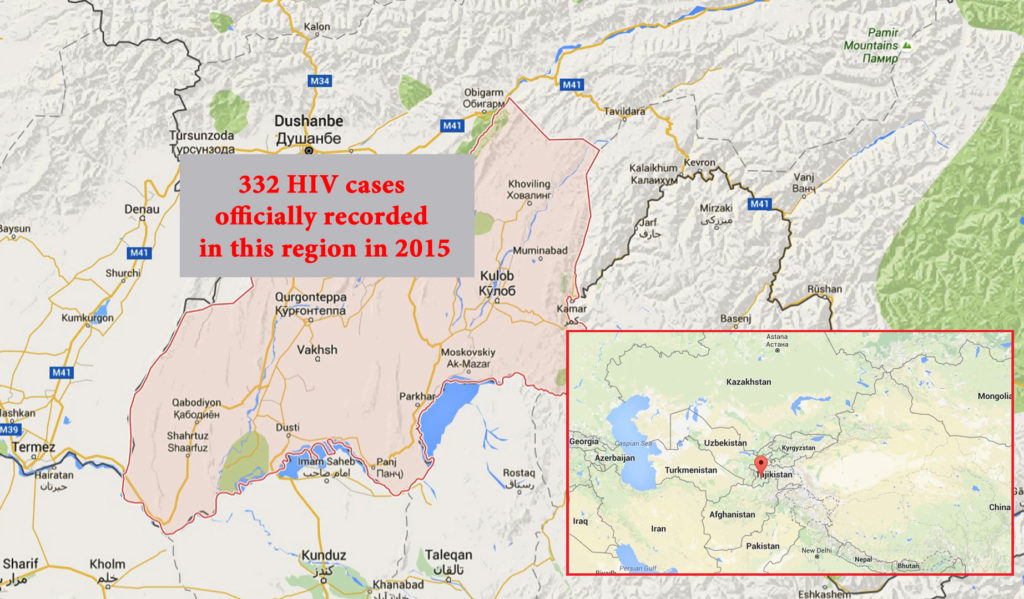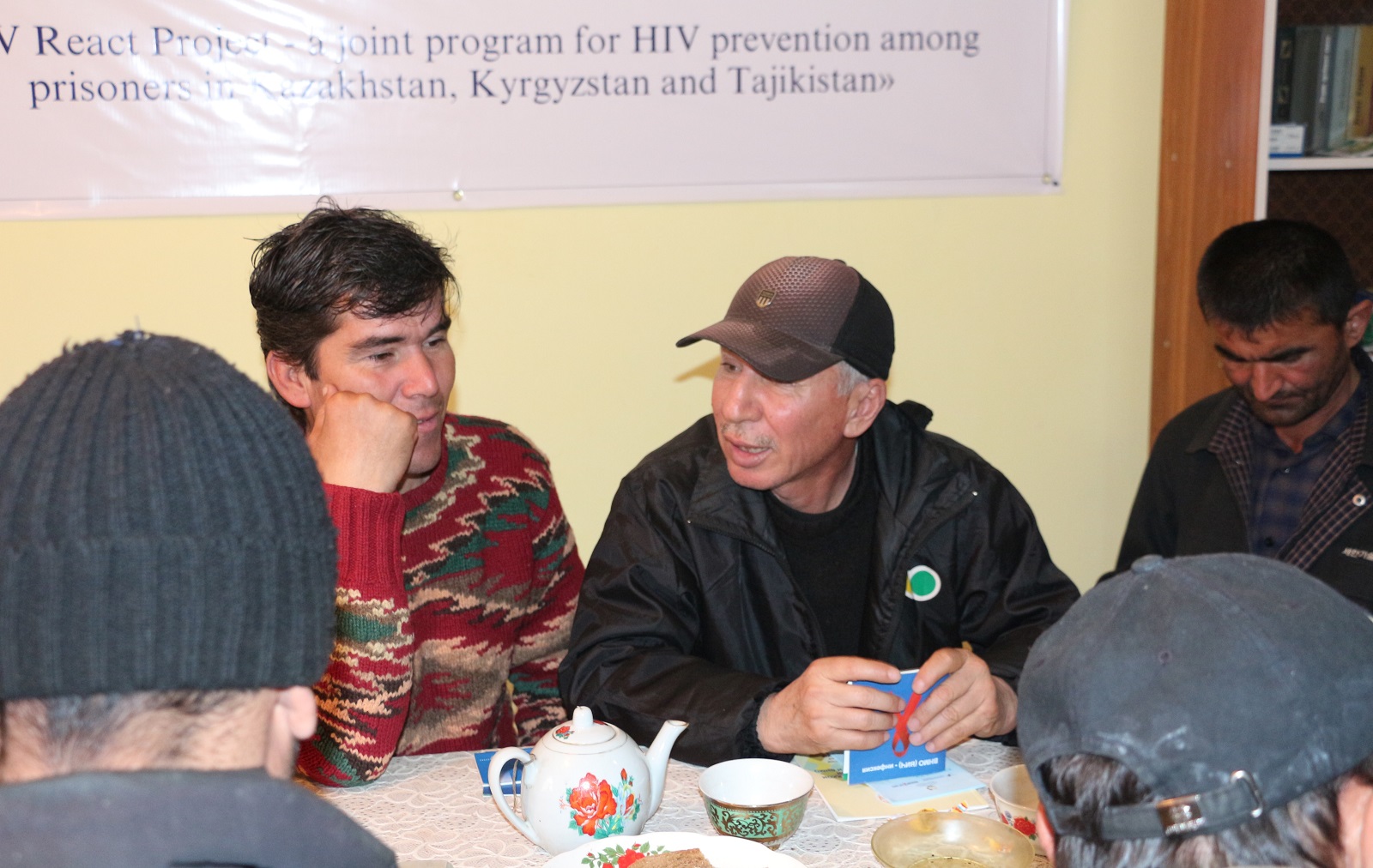The new social bureau of AIDS Foundation East-West in Tajikistan attracts diverse key populations for respectful attitude, quality services and professional counselling
In 2014, AIDS Foundation East-West (AFEW) officially opened its branch office in the Khatlon region (in the city of Qurghonteppa, formerly Kurgan-Tyube). This branch office aimed to expand prevention, treatment, care and support services for key populations at high risk of acquiring HIV and other infectious diseases.
Prior to 2014, AFEW had never provided direct healthcare, social, psychological or legal services to key populations. Instead, AFEW supported local community organisations by increasing their capacity and providing them with the skills and knowledge to offer such services. Whilst AFEW plans to continue providing technical assistance to local non-governmental organisations (NGOs), opening its own social bureau will allow AFEW to significantly increase the coverage of quality services aimed at assisting key populations.
THE HIV SITUATION AND LOCAL CONTEXT
High unemployment rates persist in Tajikistan. Official figures indicate that 2.6% of the economically active Tajik population currently have no job, whilst many Tajik migrant labourers returned home following the Russian economic crisis. According to World Bank data from 2014, one-third of Tajikistan’s population lives below the poverty line.
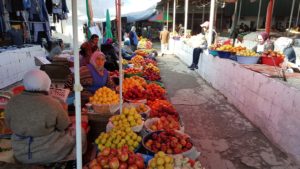
Tajikistan lies along the primary transit routes of Afghan drugs making their way to Russia and eventually Europe. The Tajik–Afghan border stretches for 15 000 km, a considerable portion of which lies along rugged mountain terrain, ideal for trafficking. According to official data from 2005, officials seized 4676 kg of opiates illicitly trafficked. Since then, the volume of narcotics exported from Afghanistan has continually increased. Between 2010 and 2015, authorities seized 31 696 kg of illicit drugs.
The availability of drugs, and the high rates of poverty and unemployment in Tajikistan, relate to other demographic characteristics and statistics in the country. For example, in 2004, the estimated number of sex workers reached more than 14 000 individuals. As of 2015, unprotected sexual contact accounted for nearly 62% of all newly registered cases of HIV.
Considering these factors, AFEW chose the location of its social bureau deliberately. The Khatlon region stands as the most densely populated area in Tajikistan. According to Republican AIDS Centre data, since 2013, this region is home to the highest number of new HIV cases.
SOCIAL BUREAU STAFF
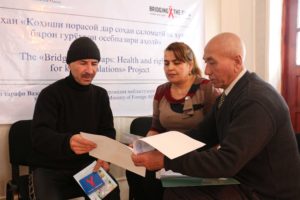
AFEW’s head office in Dushanbe — Tajikistan’s capital — took matters related to human resources for the new social bureau quite seriously. Of primary importance, setting and maintaining high standards for the social bureau received particular focus since the facility would serve as an example for other NGOs. Today, AFEW is genuinely proud of its branch office staff given how well-known and respected they are within Qurghonteppa and the surrounding region.
Until recently, Tursunpulod Norkulov, PhD (on the right) worked as the chief physician at the Regional AIDS Centre. Today, Dr Norkulov serves as a project specialist at AFEW’s social bureau. His nurse at the AIDS Centre, Kurbongul Alimova (middle) — also a trained biologist and virologist — works as a social worker within the bureau. Clients seeking services from AFEW know both Dr Norkulov and Ms. Alimova from their work at the AIDS centre. Clients also confess to experiencing better attitudes towards those seeking services at AFEW compared to elsewhere. Each individual consultation or group meeting traditionally begins with inquiries about the client’s health, exchanging news from one’s private life and a discussion about any successes and problems the client recently experienced.
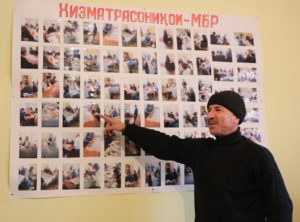 Jurabek is one of the most active participants of such meetings. In the past, this 48-year-old man used drugs. He now works at AFEW as an outreach worker. Jurabek knows all of the places in town where people who use drugs typically congregate, and many of those who use drugs know him. In 2015, he reached 190 individuals through his work, 14 of whom joined the opioid substitution therapy (OST) programme.
Jurabek is one of the most active participants of such meetings. In the past, this 48-year-old man used drugs. He now works at AFEW as an outreach worker. Jurabek knows all of the places in town where people who use drugs typically congregate, and many of those who use drugs know him. In 2015, he reached 190 individuals through his work, 14 of whom joined the opioid substitution therapy (OST) programme.
Jurabek: ‘People who use drugs do not believe in substitution therapy, because drug dealers tell them that the state is deliberately handing out methadone in order to get rid of drug users in a year or two. But, of course, this is not true and only serves to keep their clients buying street drugs. Every time I hear this myth, I tell them my own story—that I myself was on methadone, began to feel well and have now stopped taking methadone completely.’
Alisher, another AFEW outreach worker, uses the same approach when working with people living with HIV. Many are afraid to initiate treatment for HIV, or quit soon after they start it because they lack accurate information about antiretroviral treatment.
Alisher: ‘I work with HIV-positive families, and visit them together with my wife. The AIDS centre provides us with information on those who have quit treatment. The most important elements to this work consist of trust and communication. My wife and I explain to them everything that we did not hear ourselves when we needed it: information related to the side effects of treatment, the importance of continuing treatment and so on.’
CLIENTS
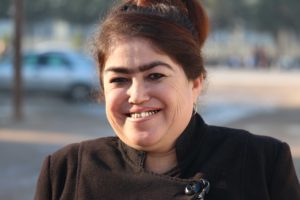 Zhanna (42), a sex worker, divorced her husband when he found another woman when working as a migrant labourer in Russia. Finding herself alone with two young children, she became a sex worker to support herself and her family. When the opportunity arises, Zhanna also cleans houses.
Zhanna (42), a sex worker, divorced her husband when he found another woman when working as a migrant labourer in Russia. Finding herself alone with two young children, she became a sex worker to support herself and her family. When the opportunity arises, Zhanna also cleans houses.
She visited the social bureau initially when it opened, and continues to visit it regularly now. Here, she picks up informational brochures, takes part in information sessions and group consultations or simply comes to chat with other clients. Social worker Kurbongul regularly accompanies Zhanna during her consultations for various tests and consultations at the women’s health and infectious disease clinics. Every three months, Zhanna undergoes HIV testing.
‘I love myself and value my health,’ she said. When asked if she always uses condoms, Zhanna said that she doesn’t always with her regular clients.
She said, when she suggests that her clients use condoms, they suspect her of having a sexually transmitted infection.
Zhanna: ‘Then, I explain to them that it is for my own protection, because not all diseases have visible symptoms, including HIV.’
In future, Zhanna hopes to find a permanent job. Now, she is busy gathering the paperwork necessary to work as a kindergarten teacher.
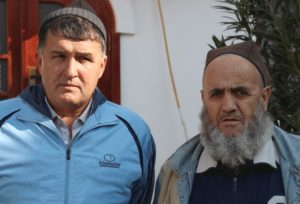 Sharifbek Safarov (left) is 54 years old. He is a Master of Sport on the national wrestling team, a six-time Tajik champion and a Candidate for Master of Sport in judo. For many years, he worked as a wrestling coach. The difficult economic situation, as well as the instability resulting from the civil war in Tajikistan between 1992 and 1997 and the flow of drugs from neighbouring Afghanistan contributed to many young people, including Sharifbek, picking up heroin use.
Sharifbek Safarov (left) is 54 years old. He is a Master of Sport on the national wrestling team, a six-time Tajik champion and a Candidate for Master of Sport in judo. For many years, he worked as a wrestling coach. The difficult economic situation, as well as the instability resulting from the civil war in Tajikistan between 1992 and 1997 and the flow of drugs from neighbouring Afghanistan contributed to many young people, including Sharifbek, picking up heroin use.
Sharifbek: ‘For a pair of rubber galoshes, dealers doled out a half kilo of opium.’
In June 2014, Sharifbek met an outreach worker from AFEW’s branch office in the Khatlon region. After Sharifbek underwent an HIV test and screening for tuberculosis, he was offered enrolment in an OST programme.
Thanks to OST and support from social workers, Sharifbek returned to his favourite job. Today, his wrestling programme includes around 70 teenagers, for which he receives a salary from the state. In addition, his methadone dosage is gradually decreasing. With a diploma from a sports college, despite his age, Sharifbek also hopes to complete further higher education training and receive a diploma from the Sports Pedagogical Institute.
Together with his friend, Bobokhuja Badridinov (right)—who is also a client of the OST programme—they often visit AFEW’s branch office to take part in the group sessions with active drug users. In doing so, they explain the advantages of OST and the resulting positive changes to their own lives.
‘Methadone has literally saved us. We can work and feed our families. There is no need to look for drugs. It means there are fewer health risks and chances that we will get into trouble with the law.’
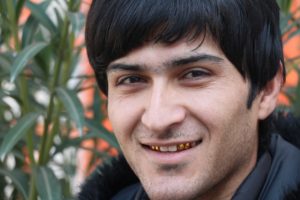 Shodi (24) is a volunteer at AFEW’s social bureau. He conducts thematic mini training sessions for men who have sex with men and accompanies them to the AIDS centre and infectious diseases clinic. Nearly 20 individuals attend training sessions.
Shodi (24) is a volunteer at AFEW’s social bureau. He conducts thematic mini training sessions for men who have sex with men and accompanies them to the AIDS centre and infectious diseases clinic. Nearly 20 individuals attend training sessions.
With his boyfriend, whom he met on a popular social network, Shodi regularly undergoes HIV testing. Whilst the couple has been together nearly three years, their parents remain ignorant of their relationship—they think that the two are simply good friends.
Shodi: ‘In Tajikistan, every man must marry a woman. Marriage also awaits both of us. However, this won’t be a problem for us—we will continue our relationship as always.’
In addition to his work at AFEW’s social bureau, Shodi also works as a waiter at a local cafe. When asked by his boss, Shodi performs Indian and Tajik national dances.
Whilst AFEW’s social bureau provides services to all key populations, the majority of its clients consist of people who use drugs. None of those who use drugs holds a permanent job and almost all of them served time in prison. Many clients come directly to the social bureau upon release from prison carrying AFEW’s business cards in their hands. Since September 2014, AFEW has regularly conducted training sessions for prisoners in two colonies in the Khatlon region, preparing individuals for release and reintegration into society. These activities fall within the framework of the Start Plus transitional client management programme. Currently, 26 individuals are enrolled in the programme, the main activities of which consist of AFEW informational sessions on the prevention of tuberculosis and HIV, personal hygiene and healthy lifestyles.
Clients come to AFEW’s social bureau for consultations on HIV and other infectious diseases. Here, they may also receive legal counselling and referrals to health centres. Many individuals visit the social bureau simply to chat with each other whilst drinking tea or playing ping-pong.
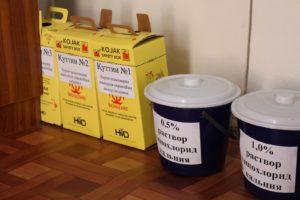 Soon, clients may undergo HIV testing on the premises of the social bureau. In September 2015, the Tajik Ministry of Health issued an order allowing on-site testing based on an AFEW initiative. To provide HIV testing services, public organisations must offer all of the necessary testing infrastructure (i.e., a separate room, equipment and materials) and the staff must complete a relevant training programme. AFEW has already met all of the requirements, including approval from the Blood Centre to handle blood samples. To begin testing, AFEW needs to amend its statute, which is also underway.
Soon, clients may undergo HIV testing on the premises of the social bureau. In September 2015, the Tajik Ministry of Health issued an order allowing on-site testing based on an AFEW initiative. To provide HIV testing services, public organisations must offer all of the necessary testing infrastructure (i.e., a separate room, equipment and materials) and the staff must complete a relevant training programme. AFEW has already met all of the requirements, including approval from the Blood Centre to handle blood samples. To begin testing, AFEW needs to amend its statute, which is also underway.
Many clients’ primary challenge centres on their lack of employment. Whilst most clients possess only a secondary education, nearly all have hands-on construction, electrical, welding and carpentry skills and experience. Many clients are willing to work in the garden to grow their own fruit and vegetables to sell, raise poultry or rabbits or initiate small-scale production of paving stones for instance. Clients argue that such opportunities would significantly change their lifestyles, habits and behaviour.
CO-OPERATION WITH STATE AGENCIES
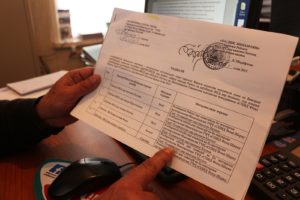
AFEW’s partnership with the Ministry of Justice’s Punishment Implementation Department to increase prisoners’ awareness of HIV prevention stands as one example of successful cooperation with state agencies. In May 2015, Tajikistan’s Interior Ministry turned to AFEW with a request to organise information sessions on HIV prevention for police personnel. Accepting this request resulted in a total of 566 police officers from district stations completing a training session. Analysis of completed pre- and post-training mandatory questionnaires demonstrated a significant improvement in knowledge about HIV and the means of prevention amongst attendees. Police training will continue in 2016.
FUTURE PLANS
We may safely say that AFEW’s branch office in the Khatlon region has hit the ground running. For such a small organisation, its list of accomplishments for just two years is rather impressive. With its multiple achievements, AFEW plans to expand its work amongst and for this region’s key populations.
Abdumadzhid Saitov, AFEW social bureau’s co-ordinator: ‘As we expand, we will try to accommodate as many of the wishes of our clients. For example, we will develop a library for them towards self-education, offering interesting and educational films. Unfortunately, we cannot address all of their wishes in the nearest future—for example, creating a dormitory for our homeless clients remains a bit beyond our reach. To organise such a place, we would need significant financial resources and qualified personnel.’
***
Like us on Facebook!
www.facebook.com/AidsFoundationEastWest

